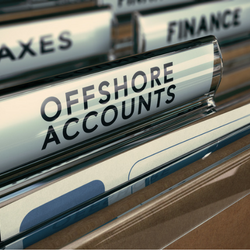
Offshore bank accounts may sound great in theory, but make sure you’re aware of all the potential problems and pitfalls attached.
The mere mention of the words “offshore bank account” is enough to conjure up thoughts of tax evasion, unreported income and a wide range of other dodgy dealings. The bad reputation of offshore accounts was further reinforced by the Panama Papers scandal of early 2016, which involved many high-profile world figures and led to the offshore accounts of 800 wealthy Australians coming under investigation by the Australian Taxation Office (ATO).
But despite their regular links with unlawful deeds, there’s actually nothing innately illegal about offshore bank accounts. So let’s take a look at 10 things you may or may not know about offshore accounts and how they work.
1. How they work
An offshore bank account is one that is opened and held in another country. Offshore accounts are usually held in countries with minimal tax rates or other financial benefits, but there are plenty of other reasons why you might need to open an offshore account. For example, maybe you need fast access to funds to manage an overseas investment property, or perhaps to pay for your child’s education at an overseas financial institution.
Banks in countries all around the world offer accounts to attract overseas customers; some major Australian banks have dedicated units that deal with foreign customers. Our guide to offshore accounts explains how you can compare your options and choose the right account for you.
2. They’re legal
Yes, you read that right – there’s nothing illegal about owning an offshore bank account. But if you don’t declare the income and earnings from that account in your annual tax return, you will find yourself on the wrong side of the law.
Australian residents are taxed on their worldwide income, which includes the money they earn from overseas assets, rental properties, and of course, bank accounts. Any income earned from an offshore account must be declared in your Australian tax return, and you can claim a foreign income tax offset in Australia if you’ve already paid tax on your earnings in another country.
3. Benefits of offshore accounts
The most obvious reason someone might want to set up an offshore bank account is to pay less tax, but there are plenty of other potential benefits offered by these accounts:
· The ability to earn more interest.
· Access to foreign investments.
· Access to foreign banking products and services.
· Greater privacy, for example, a business looking to protect its trade secrets.
· For large, well-known businesses, offshore accounts can protect against the risk of overcharging by suppliers.
4. Opening an account and making deposits
The process for opening an offshore bank account will vary depending on the financial institution. In most cases you will need to provide your passport, a bank statement and a signed declaration about the source of the funds being used to open your account. Deposits can be made by international money transfer.
5. Harsh penalties apply to non-declaration
For some, the temptation to simply not declare their offshore accounts and therefore avoid paying tax is too great. In other circumstances, such as for some of the high-profile figures caught up in the Panama Papers Scandal, offshore accounts are used to finance illegal activity or manage the unlawful income obtained from such activities, which is hardly something the average taxpayer wants to include on their next tax return.
Whatever the case may be, failing to declare your offshore account to the ATO is a big no-no and harsh penalties apply. Penalties start at around 75 per cent of the unpaid tax on those foreign earnings, plus interest, and there is always the potential for further investigation and prosecution by the Australian Federal Police or the Department of Public Prosecutions.
6. Tax havens
What do you get when you combine low tax rates, a stable political and economic climate, and a local regime that’s reluctant to disclose any information to foreign tax authorities? You get a tax haven, a country that attracts money from wealthy people and large corporations all around the world that are looking to reduce their tax bill any way they can. The Seychelles, the Cayman Islands, the British Virgin Islands, Switzerland and, until recently, Panama are all attractive destinations for money from all corners of the globe.
By setting up a bank account in a country that does not have an agreement to exchange financial information with Australia, an Australian taxpayer could theoretically avoid being taxed on the money in that account. In more complex cases, a dodgy taxpayer could set up a foreign shell company to conceal the true owner of money or other assets and make it even more difficult for the ATO to catch up with them.
7. The ATO and undisclosed accounts
In recent years, the ATO has dedicated plenty of time and resources to hunting down tax evaders all over the world, as people like Paul Hogan can testify. It’s also committed an increasing amount of resources to targeting wealthy Australians with undeclared income in offshore accounts, establishing agreements with governments and major financial institutions around the world.
From March through to December 2014, the ATO ran Project DO IT (Declare Offshore Income Today), which allowed Australians holding illegal money offshore to declare those funds and receive immunity from prosecution. These tax dodgers also had the opportunity to avoid many of the significant financial penalties normally associated with bringing this income into the Australian tax system, and as a result it’s estimated that $600 million in income and $4 billion of assets were disclosed.
8. Panama Papers investigations
The Panama Papers data leak contained information about the financial dealings of more than 214,000 financial entities connected to people in over 200 jurisdictions worldwide, including around 800 Australians. As a result, the ATO launched an investigation into the activities of those 800 people accused of hiding their wealth.
Around the world, many high-profile figures were implicated in the scandal including Vladimir Putin, David Cameron, the Prime Ministers of Iceland and Pakistan, and even kung fu film star Jackie Chan.
9. Voluntary disclosure
If you have an undeclared offshore bank account, the sooner you disclose it to the ATO the better. Coming forward before the ATO comes after you can significantly reduce the penalties imposed and also the risk of prosecution. However, you should always seek legal and tax advice from an expert, for example your accountant or lawyer, before making a voluntary disclosure.
10. Never hesitate to get professional advice
Although this article is only a very general guide to offshore bank accounts, you will have figured out by now that opening and maintaining an offshore account can be a complicated undertaking. There are many laws and regulations you need to abide by, not to mention myriad tax implications to consider.
With this in mind, it’s recommended that you get some professional financial advice before opening an offshore bank account. This will help you work out whether an offshore account is right for you, and what you need to do to ensure that everything is legal and above board.
